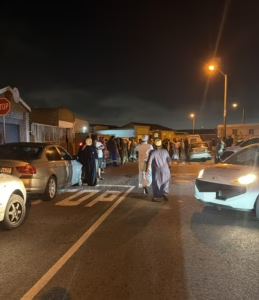Hundreds of South Africans who lost their homes due to missed bond payments, only to see these properties sold at a fraction of their actual value, are eagerly awaiting the start of a R60 billion class action lawsuit against several of the country’s leading banks. The lawsuit, which targets banks like Absa, Standard Bank, FirstRand Bank, and Nedbank, could potentially affect many who have been homeless and struggling for over a decade.
The homes of these individuals were often auctioned for as little as 10% of their market value. For those involved, these transactions have not only left them without shelter but have pushed them further into poverty, with little hope of recovering what they lost.
A Long Journey for Justice
The class action lawsuit, which was initiated in 2020 at the Gauteng High Court in Johannesburg, is the culmination of years of legal battles. Back in 2017, affected homeowners sought damages from the banks by appealing to the Constitutional Court. However, the Constitutional Court directed the case to the lower courts for further deliberation.
Advocate Douglas Shaw, a seasoned expert in this area of law, has been instrumental in building the case against the banks. His commitment spans years, and now the focus is on obtaining certification for the R60 billion class action. The banks, however, are contesting the lawsuit and firmly deny any wrongdoing.
Other parties involved in this matter include the South African Human Rights Commission, the Rules Board, and the Minister of Justice. Nevertheless, the primary relief being sought is from the banks themselves.
Applicants Seek Justice Amid Difficult Circumstances
Over 200 applicants are part of this class action, and they are anxiously awaiting a scheduled meeting between their legal team, the banks, and the presiding judge. This meeting, which is set to take place virtually, is expected to lay the groundwork for moving forward with the certification application.
Some of those who lost their homes spoke with Independent Media, expressing their desire for justice. One applicant shared how long they have been waiting for judicial intervention, saying,
“Some of us are living below the poverty line due to the banks, who sold the houses for a song. We just want to ensure our case is heard and that we receive justice.”
The applicants are calling on the court to represent various classes of affected individuals, including those whose properties were sold for more than 10% below their market value.
Auction Practices Under Scrutiny
Until 2017, banks in South Africa were able to sell repossessed homes at sheriff auctions without setting a reserve price, which often resulted in significant losses for homeowners. This practice left many still owing large sums to the banks, even after their homes were sold. However, in 2018, the Gauteng High Court in Pretoria introduced new rules, requiring reserve prices for properties sold by auction on behalf of banks.
The applicants argue that the actions of the defendant banks are unjustifiable in a democratic society. They believe that if the banks are found liable for past practices involving unjust sales, they should be held accountable and required to compensate those affected.
The applicants further emphasize that they are up against a powerful and well-resourced group of banks, each represented by a team of top advocates and attorneys. In contrast, the class members—a largely economically disadvantaged group—are relying on a much smaller legal team.
Mortgage Bonds and Legal Disputes
Each class member had, at various times and places, entered into mortgage bond agreements with the defendant banks. When these individuals fell behind on their bond payments, the banks obtained court orders to sell their properties through a process known as “sale in execution.” However, the applicants contend that the banks often sold these homes for far less than their market value and did not use this option as a last resort.
While the applicants acknowledge that banks have the right to sell properties to recover their security in certain cases, they dispute the constitutionality of selling homes under conditions where it is not necessary. Specifically, they argue that it is unjust to sell properties when the sale price is significantly lower than the property’s market value.
According to the applicants, the average price obtained for properties sold through these sales in execution has been around 50% of the market value. In some instances, properties were sold for as little as 10% of their true worth. Alarmingly, court documents reveal that some homes were sold for as little as R100.
The Human Cost of Low-Priced Sales
The properties sold by the banks were often the applicants’ only place of residence, meaning the impact of these sales was devastating. In most cases, the sheriff of the court, acting on the bank’s behalf, would accept a sale price far below the fair market value at the time of the sale.
The applicants argue that the market price represents the amount that would be obtained in a typical “willing buyer, willing seller” scenario if the property were sold through an estate agent. They believe that the banks could have arranged such sales instead of relying on sheriff auctions, which left homeowners significantly out of pocket.
Court documents indicate that, since the inception of South Africa’s Constitution, over one hundred thousand properties have been sold in execution under these circumstances. The applicants assert that
“The sale of properties for much less than fair market value is at great human cost…. The class members (applicants) are left with no place to live, or a much inferior place to live, which particularly flies in the face of justice when the sale is not a last resort.”
The emotional and financial toll has been immense. For many, the sale of their homes represented the loss of their life savings, leading to an uncertain future.
Conclusion Without Closure
The upcoming legal proceedings will be closely watched, not only by the applicants but by many others who have faced similar situations. This case, which pits some of the country’s most powerful financial institutions against vulnerable individuals, is more than just a legal battle—it is a fight for justice that could reshape how South African banks handle repossessed homes in the future.

















